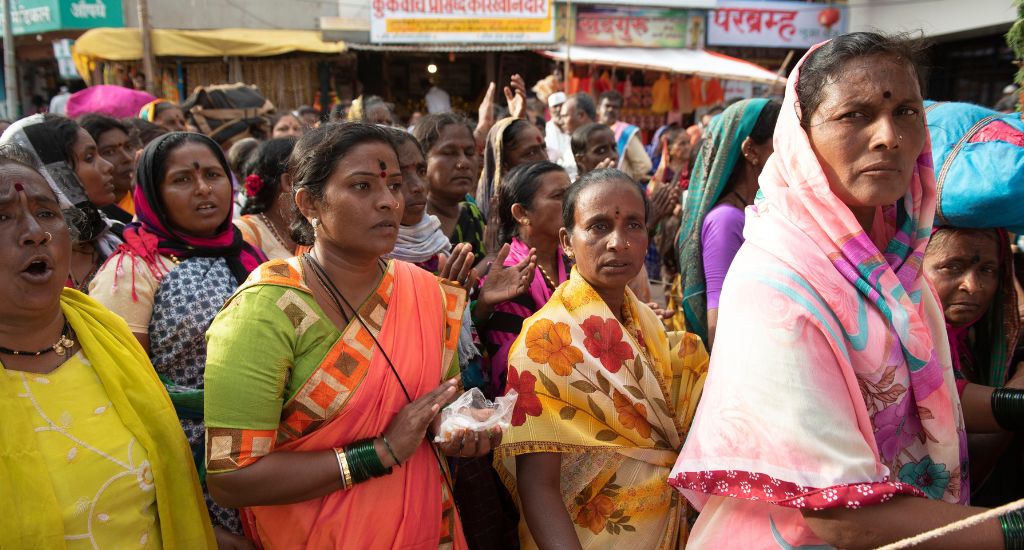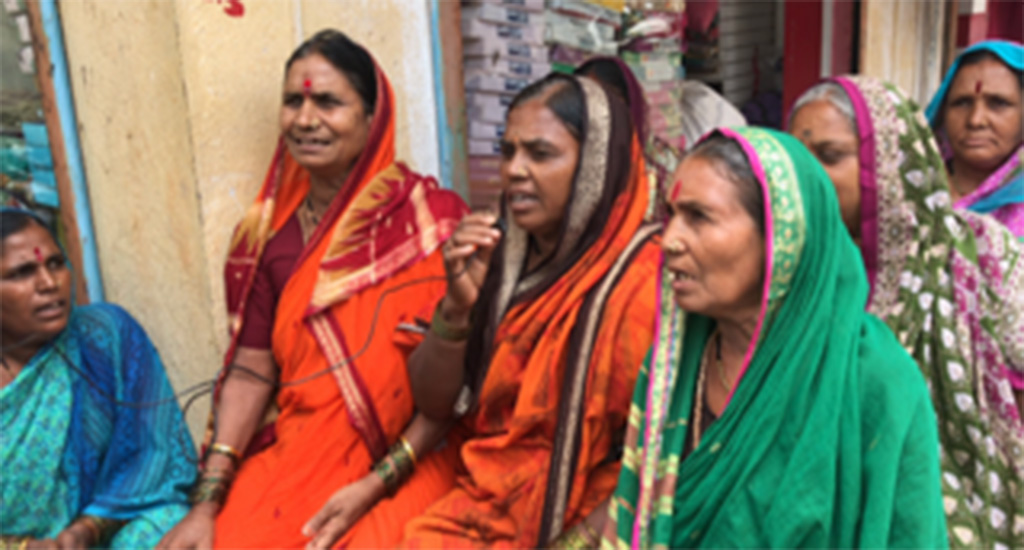
Marathi women keep alive poet Sant Janabai’s songs of life
Following the Varkari religious tradition, women in Maharashtra take pride in singing the songs of and about Janabai – a 13th century Marathi religious poet and saint.

Following the Varkari religious tradition, women in Maharashtra take pride in singing the songs of and about Janabai – a 13th century Marathi religious poet and saint.
On a sultry morning in June, just before the monsoon hit, two friends and I walked up and down a street that leads to Sant Dnyaneshwar’s temple in Alandi near Pune city.
I had just started working with Navia Natarajan, a renowned Bharatanatyam dancer, on a new project to portray the life and teachings of Sant Janabai, a mediaeval saint.
Janabai – though unlettered – is known for the songs she composed while she worked at the stone-mill, grinding grains for the family of her guru Sant Namdev.
This practice of composing songs at the stone-mill is still followed in some rural households today. And I hoped to talk to a typical Varkari woman – Varkari being a religious tradition within the bhakti movement – who would know such songs. I wanted to see Janabai through her eyes.
I thought the best place to learn about any Varkari saint would be Alandi, the seat of the Varkari tradition. I was not wrong.
I found a group of ladies sitting on the footpath near the temple.

They had travelled all the way from Vidarbha to Alandi, traversing about 700 km. They were getting ready to leave for Pandharpur, the home of the revered deity Vitthala the next day – on foot – in the dry heat of June. This is the annual practice of the Varkaris every year in the Hindu month of Ashadh.
They looked at me with an amused expression when I introduced myself.
One of them told me, “Wait for the leader of our “dindi” – the bhajan party to come. She’ll be able to tell you about Janabai.”
I asked her if she was closely connected to the saint’s tradition in any way.
“Why, yes!” this lady exclaimed. “She grinds bajri (pearl millet) everyday in her jaate (stone-mill). She knows how it really feels.”
We waited in silence until a woman wearing a red nine-yard sari came out of a crumbling, old dharamshala that overlooked the footpath.
She led her friends to sing a song attributed to Sant Janabai. The song described how Vithoba (Hindu deity also known as Vitthala) bathed the child Janabai because “she had no one else in the world to do that for her.”
When they sang there were tears and smiles at the same time.
After the song, I asked the leader about Janabai, to which she merely said, “Tell me, who washes the hair of a girl, except her mother! What more do you want to know?” This year happened to be her 27th trip to Pandharpur on foot.
My friends and I walked around a bit more and found another group of ladies, this time from Marathwada. They were rather reluctant to sing. But after a little persuasion, they told us stories from the saint’s life.
Vitthala would help her sweep and swab, and make cow-dung cakes to be used to plaster Sant Namdev’s hut. I interjected and asked them about Sant Namdev.
Isn’t she even greater than Kabir! Who would call her illiterate, tell me!
They said, “He was a great saint too and was Jani’s guru. But Jani was Vitthala’s daughter!”
They continued with their story in which Janabai taught the great mystic Kabir Das a lesson in bhakti. The dung cakes made by her sang the name of Vitthala and that made Kabir Das very humble.

“Isn’t she even greater than Kabir! Who would call her illiterate, tell me!”
I asked them if they too grind their millets at home. They said they do not. Times have changed and there are electrically operated mills to grind grains now. Nor did they know any songs of the stone-mill. But they do meet once a day and sing songs they learn in collective bhajans, or those they hear on cassettes.
Our final encounter was with an old couple from Gangakhed. Janabai was born in that very village in the year 1258. The couple and their children had been stranded in Alandi during the first lockdown. I asked them what they did during such difficult times.
See my wife here. She knows the entire Dnyaneshwari by heart. She can silence any buwa in a philosophical debate in two minutes.”
The answer came immediately.
“We collected funds from door to door and cooked meals for the stranded Varkaris every day. We must have fed over 200 children that summer. Simple bhakri and bhaaji.”
I could not hide my amazement.
The old man, who is also a reputed kirtankar from his village, looked deeply into my eyes and said in a choked voice, “See my wife here. She knows the entire Dnyaneshwari (a 13th Century commentary on the Bhagwad Gita) by heart. She can silence any buwa (learned scholar in spirituality) in a philosophical debate in two minutes. But our Jani has taught us that this life is not for silencing anybody. This life is for seva (selfless service)!”
Not wanting to burden them, we made many excuses to not have lunch with them, as we sensed that they would have to cook again.
“Jani was Vitthala’s daughter,” he said as we prepared to leave. “That is why she understood his words so well. That is why she could compose over 300 abhangas!”
As we drove back, I pondered over how being ‘Vitthala’s daughter’ meant different things for different people.
For one, it was a reminder of a respite that was probably denied to them in some manner. To another, it meant a position of greatness, the grand, the lofty that emerges from the ordinary, quotidian. To yet another, it hinted at a spiritual depth that the resilient heart seeks despite the troubles thrown at one by life.
How can any of the three not be seen as worthy of deep reflection?
A walk around Alandi taught me three different melodies that compose the song of life.
The lead image at the top shows Warkari’s women marching and singing toward Vitthala temple at Pandharpur fair(Photo by Arun Sambhu Mishra, Shutterstock)
Janhavi Phansalkar is a law graduate and a performing artist in the Hindustani vocal music styles of Dhrupad and Khayal. She is working on a project to present the songs of Sant Janabai in a contemporary format combining her music with Bharatnatyam dance.